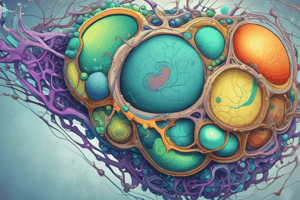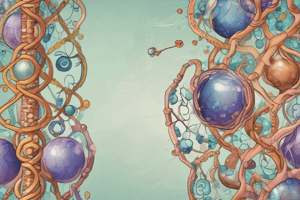Podcast
Questions and Answers
What type of cellular behaviors do cell biologists study?
What type of cellular behaviors do cell biologists study?
- Cell division, growth, and migration (correct)
- Cell differentiation, apoptosis, and necrosis
- Cell fusion, elongation, and detachment
- Cell death, shrinkage, and aggregation
Which molecular machines do cell biologists study?
Which molecular machines do cell biologists study?
- Centrioles and Golgi apparatus
- Motor proteins and enzymes (correct)
- Lysosomes and peroxisomes
- Chloroplasts and ribosomes
What is a common technique used by cell biologists to study cells?
What is a common technique used by cell biologists to study cells?
- Microscopy (correct)
- Sonography
- Radiography
- Magnetography
Why is cell biology considered fundamental for addressing challenges in medicine and biotechnology?
Why is cell biology considered fundamental for addressing challenges in medicine and biotechnology?
What kind of degree is often required for career paths like research scientist or pharmacologist in cell biology?
What kind of degree is often required for career paths like research scientist or pharmacologist in cell biology?
How will cell biologists contribute to addressing global challenges in the future?
How will cell biologists contribute to addressing global challenges in the future?
What is the primary focus of cell biology?
What is the primary focus of cell biology?
Which organelle in a cell serves as a selective gatekeeper for materials entering and leaving the cell?
Which organelle in a cell serves as a selective gatekeeper for materials entering and leaving the cell?
In cell biology, how do cells communicate with each other?
In cell biology, how do cells communicate with each other?
What key skills are required for a research assistant in a cell biology lab?
What key skills are required for a research assistant in a cell biology lab?
Which scientific disciplines are combined in the field of cell biology?
Which scientific disciplines are combined in the field of cell biology?
What is the role of mitochondria in a cell?
What is the role of mitochondria in a cell?
Flashcards are hidden until you start studying
Study Notes
Cell Biology: The Foundation of Life's Complexity
Cell biology is the scientific discipline that explores the structure, function, and behavior of cells, the fundamental units of life. It's a multidisciplinary field that combines biology, chemistry, and physics to understand how cells grow, divide, communicate, and maintain homeostasis.
The Role of a Biology Research Assistant
Research assistants, such as those found in cell biology labs, support scientists in conducting experiments and analyzing data. They may assist with laboratory operations, maintain equipment, and help with data management and organization. To succeed in this role, one must have a strong understanding of biological processes, the ability to follow detailed instructions, and excellent communication skills.
Understanding Cellular Structure and Function
At the heart of cell biology is the study of cell organelles, such as the nucleus, endoplasmic reticulum, and mitochondria, each with specific functions that enable the cell to perform its duties. Cell biologists also study the plasma membrane, which serves as a barrier and acts as a selective gatekeeper for materials entering and leaving the cell.
Communication and Interaction of Cells
Cells communicate with one another through various mechanisms, such as direct contact, the release of signaling molecules, and the exchange of vesicles. These interactions are essential for processes like cell differentiation and tissue development.
Dynamic Cellular Processes
Cell biology delves into the dynamic behaviors of cells, such as cell division, growth, and migration. Cells can change their shapes and reorganize their internal structures to carry out their functions.
Molecular Machinery
Cell biologists study molecular machines like motor proteins, which consume energy to move along cellular structures, and enzymes, which catalyze biochemical reactions. These machines enable cells to carry out essential tasks such as building proteins, copying DNA, and breaking down waste products.
Techniques and Tools
Cell biologists use various techniques and tools to study cells, such as microscopy, flow cytometry, and cloning to analyze genetic information.
The Importance of Cell Biology
Cell biology is a fundamental field for understanding life's complexity and is essential for addressing challenges in medicine, biotechnology, and environmental science.
Education and Career Opportunities
A strong foundation in cell biology can lead to various career paths, such as research scientist, biotechnologist, pharmacologist, and medical doctor. To excel in these roles, individuals often need a bachelor's or master's degree in biology, with experience in a research setting being highly valued.
The Future of Cell Biology
Cell biology is an ever-evolving field with new techniques and technologies emerging to help us understand life at its most fundamental level. As research and development continue, cell biologists will play an essential role in addressing global challenges and improving human health.
Studying That Suits You
Use AI to generate personalized quizzes and flashcards to suit your learning preferences.




